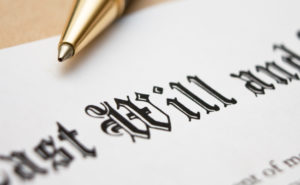When a person passes away, with a will, the first order of business is to probate the will in probate court in order to dispose of the decedent’s estate. Often times the process of probating a Will is very straight forward, but there are times that major issues arise that result in the filing of a Will contest. A Will contest is an action filed in court to challenge the validity of a Will for a number of reasons, such as: a loved one feels that the Will doesn’t accurately reflect the decedent’s wishes and possible coercion or duress was involved when the Will was executed; at the time the will was made the decedent lacked the mental capacity to execute a Will; or the Will was not executed in accordance with Texas law or does not meet the requirements of a valid Will in Texas.
Coercion/Duress/Undue Influence
Often time individuals execute their Wills at a later stage in their lives when they may be susceptible to the undue influence of an outside individual. If you feel that your loved one executed a Will that does not accurately reflect their wishes and was procured as a result of physical or mental abuse, you may be able to file a Will contest on the grounds that the testator was coerced or under extreme duress at the time the Will was executed.
Lack of Capacity
To execute a valid Will in Texas, you must have: Legal capacity: you must be over the age of 18 to execute a valid Will; Testamentary capacity: you must be of “sound mind” which means you must have the mental capacity to understand that you are executing a Will. Often times a valid Will contest can be brought on the grounds that the testator lacked the Testamentary capacity to execute a valid Will. This issue arises usually when an individual executes a will that suffers from illnesses such as, Alzheimer’s disease or Dementia. In these instances their Will may not be valid if it can be proven that at the time of executing the Will the decedent lacked the requisite capacity to make a Will.
Execution and Form
Issues as to the execution or form of a Will arise when the decedent has left a Will that they have prepared themselves. In Texas in order to have a valid Will it must be: in writing and signed by the testator, or another person at the testator’s direction and in their presence; Signed by two credible witnesses over the age of 14 in the testator’s presence. There is also the option of adding a self-proving affidavit to the Will. The self-proving affidavit substitutes for in-court testimony of witnesses as to the validity of the Will. If these procedures are not followed when executing a Will, a Will contest could be brought on the grounds that the Will execution or the form of the Will fails to meet statutory requirements. If you are considering contesting the Will of a loved one, consult with an attorney to explore your options to make a fully informed decision before proceeding with your suit.
Attorney Krystin Collins is a native of the Acres Homes Community. She is a graduate of Texas Southern University Thurgood Marshall School of Law and has been a licensed attorney since 2009. Her primary practice areas are criminal defense, civil litigation, personal injury, estate planning, and divorce. She may be contacted at 713-775-0332 or krystin.collins@gmail.com.

